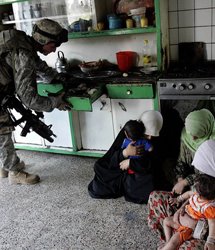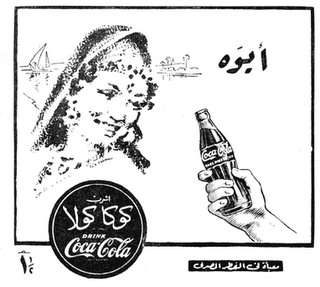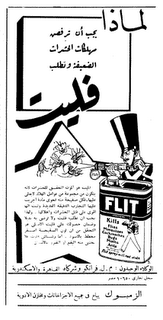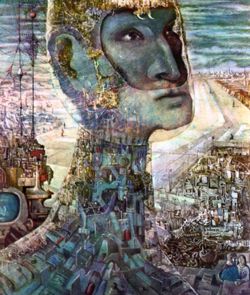Tuesday, October 31, 2006
See no evil...
Anyhow, Dream TV apparently did a story. The coverage is mild at best; mere mention of the incident and a few brief eye witness accounts. I’m hopeful the story will pick up more steam, perhaps even encourage a nation wide awareness campaign that will eradicate misogynistic attitudes…!
Ps. Video is in Arabic and was posted by Wael Abbas
Friday, October 27, 2006
Who let the dogs out?
A vicious mutation of a virus commonly known as "Rabid Heat" has been recently detected in downtown Cairo and is giving experts reason to believe that it may have spread into a full blown epidemic. Found in all males, the virus remains harmless in its dormant state. Under certain conditions of mutual consent, the virus has even proven useful, however, if left to ravage the body, the virus causes excess releases of testosterone which disrupts the flow of oxygen to the brain, closing off nerve synapses and shutting down all brain activity which inevitably leads men to behave like rabid dogs in heat.
Scientists cite strong moral fiber and respect for women as the only deterrent to the virus's horrid symptoms. As Egypt's stock of these remedies are in short supply, Downtown is hereby declared an infested zone and women are urgently requested to carry mace and exercise extreme caution for the remaining days of the eid holiday.
The writer of this warning is, saddened, sickened and enraged but most of all sorry for the inconvenience caused; we're hopeful that newer modified versions of the Egyptian male will hit markets soon.
Tuesday, October 24, 2006
El Eid Far7a!
Monday, October 23, 2006
Illustrated Fantasies
But this post isn't about them, it's about an illustrator named Essam Abdulla, who I saw sitting in a chair, alone, hunched over a notebook, sketching mad patterns gnawing on his membrane. Campus Magazine did a small exposé on him in their last issue, (the very same one Forsooth graces the pages of ) and printed a couple of his images, one of which has Mickey Mouse, amongst other things, emerging from a guy's penis.
His work draws faint but really interesting comparisons to Gazzar's nightmarish sketches. Check out his animation below called "Assortment of Undigested Seafood" on youtube. If this link doesn't work then go directly to youtube and search Undigested Seafood. It's disturbed, violent, nervous, haunting yet cheeky and strangely endearing...I love it!
Sunday, October 22, 2006
Cultural boycott and misinformation
Many of the opponents of a cultural boycott of Israeli institutions have been spreading misinformation about boycott and dismantling the hard work of many people. The most incorrect and most harmful fabrication is that the boycott is directed at individual Israelis. Elia’s Suleiman’s recent letter brings up some very important points, namely that certain Israeli individuals have indeed been mistreated at film festivals recently by people who also believe in boycott. This reality is a shame and should be addressed. To be clear, the call for boycott has always been very explicit –always directed at institutions or organizations that receiveIsraeli government funds and/or remain silent on Israel’s brutal oppression of the Palestinian people. It has never been directed at individuals. In all the letters, petitions, calls and information about boycott, this has been made absolutely clear. That is not to say that some people in the world, some who have happened to sign the boycott and some who probably don’t even know acted in ways that are harmful, racist or unfair.
Secondly the boycott is not called for "by Palestinian and Lebanese artists". The boycott is, in fact, called for by Palestinian artists and asking for the support of the international community in this struggle. If you look closely at the signatories of boycott, you will see that the call is from 123 Palestinian artists. In the longlist of non-Palestinian endorsements, you will also see that infact, more Israelis and Jews have signed in support of boycott than Lebanese. As a supporter of the boycott, I believe in what it attempts. As Nelson Mandela said, boycott is not a principle but a tactic depending on circumstances. For many, boycott is a non-violent method to resist the ethnic cleansing of the Palestinians. Especially at a time where, after 58 years of resisting Israeli oppression and apartheid, nothing else has worked. So when certain individuals act in ways I may not agree with, I know they do it as independent people. And certainly not in the name of the boycott I signed and believe in. And with all respect to the Israeli filmmakers who were mistreated, the case for boycott is much bigger than the random incidents that made them feel isolated. As true supporters of the Palestinian cause, I would hope they would understand that and that thei solidarity is not so fragile or based on what happens to them at film festivals but rather at what happens to the millions of Palestinians struggling for their freedom every day.
Annemarie Jacir
Galloway on visual communication...and much more
ps. Thanks D for emailing this to me. Keep 'em comin babe!
See Galloway video here
مش عاوز استحماااااااااااااا
 I have a feeling I can spend hours delineating the many overt and covert meanings at play here...but mostly I'd like to know why they're so determined to give him a bath, and why he's so adamant against it?! Is it perhaps not a bath at all and they're going to drown him in broad daylight, and if so, would the egret in the background be considered an accomplice if he doesn't notify the police?
I have a feeling I can spend hours delineating the many overt and covert meanings at play here...but mostly I'd like to know why they're so determined to give him a bath, and why he's so adamant against it?! Is it perhaps not a bath at all and they're going to drown him in broad daylight, and if so, would the egret in the background be considered an accomplice if he doesn't notify the police?
Saturday, October 21, 2006
...What dreams may come
ps. if any of you have pictures of these ads please let me know and I'll send you my email so you can forward them.
A commentary on commentaries...
I had been pining for a while over what I perceive as the need for critical engagement that goes beyond reflecting phenomenon but rather analyze, critique and produce further knowledge. What this entails is first an understanding of the issues then mounting an intellectual and creative challenge on the paradigm of acceptable vs. deviant. I consider this post an initial modest attempt on my behalf to begin this process and utilize it for further projects.
First of all, FGM is a custom that predates Islam and has roots in African tribal culture. It is practiced in only some corners of predominantly Muslim countries and still in some parts of the African continent. There is mostly general consensus about its ills in Muslim societies, be they medical, social or psychological, in fact, the highest religious authorities in Egypt have condemned its practice and the government has taken real steps to eradicate it. The fact that many still perform FGM is due to ignorance, which drives this, as well as other equally detrimental social practices.
Now, while some of us here are fighting to expand dialogue on notions of nationalism and identity, the west ironically continues to speak with the tongue of extremists like the Muslim Brothers who consider Muslim countries a single homogeneous bloc, completely forgoing the rich cultural diversity of over 52 nations sheltering over 1.5 billion people. In places like Egypt even elements in the Christian minority practice FGM, is that also Islam's fault? Consider if you will how Tunisia has banned polygamy, or how Turkey bans the hijab in official spaces of work. Are these not countries that continue to consider themselves Muslim? Yet the west chooses to remain conveniently ignorant of the diversity of Islamic interpretation and remain steadfast in its accusations of Islam as a terror wielding female oppressing religion. We blame ignorance for the spread of HIV AIDS in Africa and not a sort of cultural vice specific to Africans. When someone has the audacity to blame gang violence in America on an African American cultural penchant for violence we don't hesitate to call them racist, yet it’s become acceptable today to berate Islam, as religion and culture, and call it aggressive, irrational and oppressive based on erroneous and ill informed western constructs and perceptions motivated by xenophobia and intolerance rather than genuine interest and intellectual engagement as Mr. Jack Straw will have us think. The circular discussion over the veil represented for the most part by the equation “religious oppression vs. freedom of choice” frankly bores the life out of me. The truth is, there are Muslims who consider the veil a “farida” (religious exigency) and there are others who don’t, and while it is taken for granted that unveiled women are more liberal than others, there is absolutely no evidence to suggest that the camp you choose determines the degree to which you oppress women or the number of your relatives who have flown planes into buildings. There are also far more interesting intellectual debates taking place in Muslim societies and some very progressive stances being taken, but the west, and the defunct religious pundits who make it their life’s work to reply to the their inanities, are completely blind to the dynamics of our culture which continues to shed skin and re-invent itself, finding new ways of expressing itself, like the phenomena of young veiled women’s fashion in Egypt, which circumvents prevailing conservative tendencies while still upholding their traditional values; because regardless of what the veil may represent or symbolize, at the end of the day people just want to fit in, women are no exception.
It is difficult for a person from the west to have access to locally brewed critical thinking, let alone grasp the multilayered nuances of the region's rich cultural fabric, yet it is no excuse for someone to insinuate that only people in "free societies", meaning the west of course, are offended by oppression as Maggie suggests in Basil’s post The Issue of the Veil. Let's look at this statement in light of a poll recently conducted by BBC which revealed that in Israel, where the largest percentage endorsing torture worldwide was found, the majority of Jewish respondents (53%) favor allowing governments to use torture to obtain information while in contrast, Muslims in Israel (who represented 16% of total responses in that country) are overwhelmingly (87%) against any use of torture. I wonder if people will now infer that Judaism encourages the use of torture…
Like the late Edward Said explained, the world needs humanists who truly pursue emotional bonds with one another that transcend differences. It would do all of us a favor to pursue a balanced and critical understanding of the topics before launching vituperations and ill founded criticisms, there are those who practice Islam and yet (lo and behold) believe in justice, equality and compassion...
Friday, October 20, 2006
It's the people stupid!
Egypt's development projects only benefit the rich
The centerpiece of successful - i.e. long-term, organic - town and city development is usually a community enterprise or institution, concretized by a structure that declares the community's primary need or intent. For example, a harbor serving fishermen, a marketplace for farmers or craftsmen, a place of worship serving a spiritual ideal, a university serving the acquisition of knowledge, or a town hall, where citizens can agree upon their priorities for growth. In Egypt, however, the prevailing belief is that the centerpiece of urban development is the luxury resort, serving tourists, or gated residential communities, serving the rich.
Although developing relatively empty tracts of desert requires a decision regarding a future town's raison d'etre, choosing to cater to foreigners or the wealthy limits the town's growth from the outset by its exclusionary nature. But the choices of Egypt's decision-making elite are not designed to be inclusive, and are therefore neither organic nor wise.
Instead of responding to the needs of the larger community - for good schools, medical facilities, affordable housing, proximity to viable employment - the decision-making elite that has successfully monopolized Egypt's direction for decades tends to choose the quickest, most self-enriching path. Moreover, it tries to sell its self-aggrandizement to the public as altruistic economic progress. The most commanding feature of Egypt's real-estate development since the onset of the 1990s reform is the fact that it couldn't be less real.
It started with a series of compounds in Cairo's satellite cities whose names reflect their aspirations - Dreamland, Utopia, Beverly Hills - many still awaiting a prosperous clientele. Concurrently, a burst of seaside building resulted in the aesthetically and environmentally disastrous development of the mainland Red Sea and Sinai coasts. The last intifada slowed or stopped many of the smaller Sinai projects; their concrete shells dot the coast from Taba to Sharm el-Sheikh. But the deeper-pocket investments are works in progress, luxurious resorts with residential elements, none of which appears to have achieved 100 percent occupancy or sufficient permanent habitants to justify claims of town-building.
Last year, President Hosni Mubarak endorsed tourism-related development, since tourism is Egypt's biggest hard currency earner, and it employs 10 percent of the work force. This year, Tourism Minister Zoheir Garranah announced a commitment to add some 15,000 new hotel rooms annually, since every room under construction yields five to seven jobs; once built each represents two to three direct, and numerous indirect, employment opportunities.
But these jobs are mostly menial, and top management positions often go to foreigners. The tourism sector involves only a third as many workers as agriculture, which contributes 25 percent of GDP and exports, yet there are no plans of equal enthusiasm to develop that.
Presumably the many subsistence farmers obliged to sell their land as real estate can serve foreigners or rich compatriots as chambermaids and bell boys. Half of the country's poor live in the ramshackle villages of Upper Egypt, the area with the country's highest infant mortality rates - 36 percent above the national average. Will tourism help salvage these towns, indeed any of those in provincial Egypt?
Admittedly, the possibility of developing vast tracts of pristine coast is more alluring than addressing the messy problems of existing urban settlements. But when the choices for development ignore the latter to such an extent, one wonders if it deserves to be called development at all. Tourism relies on uncontrollable factors, i.e. foreign visitors who may or may not come by the millions. But supposing they do, it's hard to see how more beach resorts will benefit the Egyptian majority, or create attractive living alternatives for the population of approximately 30 million concentrated around Greater Cairo. http://www.dailystar.com.lb
Nevertheless, a new wave of luxury resort building, billed as town development, is under way. It differs from the previous one in that the targeted land includes the northern Mediterranean coast and Greater Cairo, and it is being sold in large parcels, not to Egyptians, but to Gulf investors. The latter need new destinations, not only for their "surplus wealth," but for themselves. Gulf tourism in Egypt is up around 20 percent over last year. Gulf investments valued at $200 billion have been withdrawn from the United States post- 9/11, and aside from Europe, Egypt offers a comfortable alternative.
A Dubai-based group called Emaar recently acquired over 6 square kilometers of prime coastal land around Sidi Abdel-Rahman for $28 per square meter, with plans to invest $6 billion. Investment Minister Mahmoud Moheiddin says the project will include two five-star hotels, a marina, a golf course, a shopping center, a mosque, a helipad, and sports facilities. Emaar also acquired several other major parcels slated for upscale development, one in the Qatamiyya district in eastern Cairo and another in the city center.
Qatar-based Barwa Real Estate also has city-building plans for a huge plot in Qatamiyya, with an investment of over $1 billion. The upscale, Saudi-financed City Stars Mall occupies almost a square kilometer of the Nasser City district in eastern Cairo and represents $800 million in investment. The Kuwaiti Kharafi Group had the jump on the above mentioned investors. It purchased an 18-kilometer strip of Red Sea coast near Marsa Alam in 1998 for just $2 per square meter and its five-star "town" called Port Ghalib is already receiving guests.
Moheiddin says that other important sales will soon be announced. He also tells us that part of the proceeds from the Emaar sale will help fund restorations of Egypt's historic hotels. Great. Assumedly, they will also help fund the removal of some 12 million land mines left over from World War II, whose presence, paradoxically, protected parts of the Mediterranean coast until now.
Although the government trumpets these investments as economic achievements, it is nevertheless selling a priceless patrimony out from under its citizens' feet, as if it owned this land by sovereign right. Its willingness to award high-bidding foreigners with key developments that cannot significantly better the lot of average Egyptians betrays a failure to prioritize, conceive and finance its own infrastructure improvements. These major sales and their proposed developments should be seen for what they are: not seedling towns or economic cure-alls, but the last resort of an ethically and imaginatively bankrupt elite.
Maria Golia is author of a book on Cairo titled "City of Sand." She wrote this commentary for THE DAILY STAR.
Ya Nakhletain fil 3alaly...!
To boycott, or not to boycott is not the question...It's how to boycott
To whom it may concern,
I hereby suspend my signature from the petition of Palestinian and Lebanese artists, which calls for a boycott of, what was supposed to have been, all cultural activities participated in and sponsored by the state of Israel. I signed and vehemently supported this petition against the barbaric Israeli war of destruction of Lebanon and its continuing ethnic cleansing of the Palestinian people. My suspension comes in protest of the practices of certain artist petitioners who recently participated in cultural activities around the world. Such practices involved the boycott of filmmaker (individuals) known to these petitioners as(individual) artists who strongly support Palestinian and Lebanese resistance, align themselves with these struggles in political and cultural domains and whose artistic work testifies to nothing but that; artists whose moral and intellectual stands and artistic production haunt segregation walls and promote and engage in Palestinian and Arab culture around the world. Yet these filmmakers have been boycotted, ordered away, deserted as people of the plague because they happen to carry the Israeli identity. Whether misguided by anger and frustration due to the latest episode of Israeli military’s monstrosity, by nationalist sentiments, or even by sheer ignorance, I am nevertheless appalled that these Palestinian and Lebanese artists, themselves victims of Israeli military policies and layers of occupations, can turn at such ease and mimic the power of authority of their own oppressors and conduct exclusionist policies, excommunications and random intellectual lynching, all of which is tinted by chauvinism and other heresies that stem from the dark side of nationalism. If the involved artist petitioners suffer from a shortsightedness that reaches only the frontiers of identities, they should be aware that they now themselves have commenced putting up checkpoints and demanding IDs to select who goes in and who goes down on his or her knees blindfolded and facing the wall. Given who these Israeli artists are and the nature of their political work, in the name of whom and for what sacred collective cause did the respected petitioner artists and filmmakers line their fellow Israeli artists and filmmakers on the wall for a cultural execution?! And after the easy to reach easy to frame ‘comrades’ are sacrificed and gotten rid of because of who they happen to be, one cannot but wonder who will be next on the witch hunting list?!I wish that the suspension of my signature will not itself become the centre of debate or finger pinpointing. I also wish that I am neither approached nor reproached for my decision by my fellow petitioners. I rather hope that the suspension can raise question sand initiate an evaluation of the text of the petition and the course of its application. And rather than an immediate response for my decision, I call upon the petitioners to take time and reflect upon themselves the issues raised here. I call upon them as I will call upon myself to enter a process of self evaluation enhanced with a critical approach of one’s own consciousness as to what composes the red lines of moral and political boundaries. I say this because I believe that should one extend his or her sight beyond one’s own checkpoints, and should one’s vision pierce through the walls he or she reincarnates for him or herself, she or he might find that it is not at all a question of identity that one should uphold in the quest for truth and justice. It is instead a question of identification. It is a quest coated inside out with the pleasures and pains which extend and communicate our individual humanity with the rest of humanity. Isn’t that after all what art is all about?
Thursday, October 12, 2006
Lest we forget...
Just a thought...
Wednesday, October 11, 2006
The trials and tribulations of J. Alfred Prufrock
The Doc. administered a concoction of anti depressants that turned me into a turnip. I remember falling asleep once in a restaurant right between the main course and dessert; just put my head down until khkhkhkhkh……..It didn't take long for me to quit the meds and the quack...
Since then, and over the course of 10 years I've intermittently visited psychologists, psychiatrists, and councilors, who have managed to add adult ADD (attention deficit disorder) to the roster, but from what I hear there isn’t a person on the planet not suffering at least one symptom of this condition.
I’ve been thinking recently of seeing a therapist again. I don’t ask myself many questions anymore about why I might need therapy; I just follow my instincts when they tell me I need some kind of help. I believe in therapy, but I hate dependency so I usually don’t last very long on the couch, which probably explains why I keep going back.
Guess I’ll be posting about that soon…
Monday, October 09, 2006
I ♥ Hizbolla

Sunday, October 08, 2006
Personal Space
So what seems to be the problem? Well, I've chosen a very difficult path for my life, for starters I gave up studying Economics at university and decided to take up Literature instead. I gave up the corporate sector after peddling lies in the advertising world for a while, then chose to work in 'development' but not the megabux USAID version rather the real 'get your hands dirty-on the ground' civil society version, and in arts and culture of all fields. So after a couple of years of exciting work with with various international and local organizations, reality strikes again; I'm turning 30 soon, I got no job, I live with my parents, and oh can't find the right girl.
The question is, is it at all possible to find that job that will make use of my passion for creativity but will also allow me to live a comfortable life.. I mean, many of my comrades, either artists, writers, curators or arts managers face the very same issues but we all get by, project by project, rabbak karim. Trouble is I don't want to live with this insecurity anymore, I had grand plans for a family with lots of kids, a decent home, a dog in the back yard, trips to exotic locations, a good education for my children...I did mention I lived in the Gulf right?!
Anyway, I'm not very rational right now, just had to vent after a seroius clash with the powers that be...can you believe they're asking me why not work in a bank! It's not their fault really, they just have no concept of what I do, or why, they just keep repeating it could still remain a hobby on the side while I work somewhere that'll pay me lots of moneeeeeyyyyyy!
The fucking rat race man...
Saturday, October 07, 2006
Ghandi
What I want to achieve, what I have been striving and pining to achieve, is self realization to see God face to face...All that I do by way of speaking and writing and all my ventures in the political field are directed to this end
Wednesday, October 04, 2006
Re-visions
 I remember a time when I transcended the line between wakefulness and sleep. My dreams informed my conciousness and my wakeful existence fed my dreams. There was a harmony of being and clarity of sight that carried me through life with amusement and certainty. I look back now and liken that phase to the few seconds on the crest of a ferris wheel's curve into the heavens. As the cabin slowly rises above the park the cacophony subsides and the smell of metal, sweat and candy corn give way to a thin jasmin scented breeze. You reach the top and suspended in mid air high above everything you've left behind, the shimmering colores of unexplored rides beckon...and you almost feel special.
I remember a time when I transcended the line between wakefulness and sleep. My dreams informed my conciousness and my wakeful existence fed my dreams. There was a harmony of being and clarity of sight that carried me through life with amusement and certainty. I look back now and liken that phase to the few seconds on the crest of a ferris wheel's curve into the heavens. As the cabin slowly rises above the park the cacophony subsides and the smell of metal, sweat and candy corn give way to a thin jasmin scented breeze. You reach the top and suspended in mid air high above everything you've left behind, the shimmering colores of unexplored rides beckon...and you almost feel special.
Tuesday, October 03, 2006
Conflagrations
Neon lights shroud the room in an austere sterile white canopy. An old blood red carpet lies massacred over the dusty parquet in the middle of the room. On top of it a pile of magazines vie for attention over a rectagular glass table. In the corner, a gigantic lamp with a metal stump and an orange shade sits atop an antique wooden chest with bite marks on its corners and the fading memory of a tea glass on its surface. In front of him a large painting hangs choking on the weight of a golden baroque frame. Underneath it an oversized green leather reception chair seats an impish man puffing nervously on a cigarette, his face hardly discernable from within the shroud of smoke. The man's left arm rises and falls to a silent rhythm, his hand contorts violently digging its nails in the armrest when it falls and its palm when it rises. He stares at the painting instead. A woman draped in white linen sits on her knees, half turned, smiling coyly over her left shoulder. He thinks he can spot a nipple peeping out of her left breast. "Ustad Mohammed", he pounces startled, the book on his lap falls to the floor. “Aiwa” he says clumsily raising his right hand as he bends down to pick up the book with his left. “Etfaddal”, the nurse says ushering him down the dark corridor.








